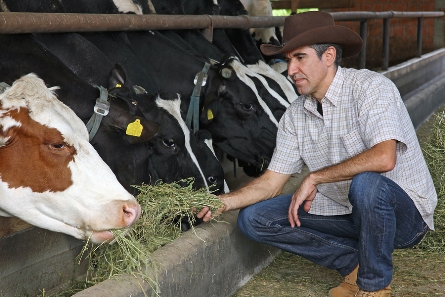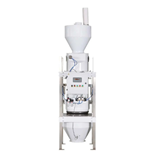At last count there were still more than 130,000 farm businesses in Australia, almost all of them family owned and operated. These farms directly employ some 300,000 people and generate $48.7 billion in revenue, supplying 93 per cent of Australia's domestic food supply while at the same time exporting 60 per cent of what they grow and produce.
At a snapshot the numbers may sound healthy but the pro-farming lobby and the farmers themselves say otherwise, and the periodic media coverage they receive details a predictable narrative of woes – drought, debt, red tape, a lack of infrastructure, investment and above all, profitability.
Farmers speak up
Patrick Francis is a second generation cattle farmer and the owner of Moffitts Farm, a 50 hectare property located 50km north of Melbourne. According to Francis, Australia's grain and livestock farmers are often championed as being world leaders in terms of production efficiency when it suits policy makers to tell a good story, but the subject of profitability seems to be taboo.
"The overwhelming opinion seems to be that Australian farmers are exceptionally well placed to take advantage of increasing demand for food from a growing world population, especially amongst the increasing percentage of middle income earners in developing Asian countries," Francis said.
"To take advantage of these market opportunities many industry analysts contend agriculture needs to attract overseas investors.
"While this message is loud and clear from bankers, investment consultants, politicians, and agribusiness CEOs, it invariably omits any reference to the relationship of the farm gate price for commodities and the final price it commands in consumers' hands.
"In other words where is the profit to be derived for Australia's grain and livestock farmers to keep them in businesses supplying livestock, grain and milk to processors in Australia or overseas?
"There is plenty of anecdotal evidence emerging that professional farmers in both the dairy, grains and red meat sectors are under enormous pressure to maintain profitability. And…prospects for improvement are not strong because despite growing demand, prices for commodities are constantly under downward pressure from the entire post-farm gate demand chain."
Profitability agenda
Francis is not alone in his concerns, with profitability also top of the agenda for peak industry body the National Farmers' Federation (NFF).
NFF President, Brett Finlay, said a number of issues were on the NFF's radar – trade, infrastructure and drought policy to name three – but none more so than the ongoing issue of farmer profitability.
"From what our members are saying, profitability inside the farm gate is at the heart of Australian agribusiness, benefiting the entire supply-chain and rural communities," Finlay said.
"I've heard much about sustainability over the past decades, and while it is important to ensure our agricultural industries operate in an environmentally and socially sustainable way, we can only continue to operate if we are profitable.
"While our export opportunities continue to grow, we must ensure profits inside the farm gate enable our agribusinesses to remain competitive on the world stage."
There were numerous factors, Finlay said, that were crucial to ensuring profitability, as the NFF had outlined in its submission to the federal government's Agricultural Competitiveness White Paper.
Nine point plan
In the NFF's submission it lays out nine key points it believes are key to the ongoing competitiveness of Australia's agriculture sector including food security, improving farm gate returns, access to finance, reducing red tape, investment and job creation, enhancing exports, and competitiveness throughout the sector's value chains.
However these recommendations come at a time when the federal government is crying poor, and the release of the National Commission of Audit report earlier this month did nothing to put farmers' minds at rest.
NFF Chief Executive Matt Linnegar said recommendations in the report such as reducing industry assistance in the form of government commitment to research and development, drought funding, and abolishing Rural Financial Counsellors suggested the Commission of Audit had a limited understanding of agriculture.
"The agriculture sector understands the pressure the budget is under. Indeed, after many recent droughts farmers know a bit about tight finances. But the fact is, there is simply no 'fat' to cut in agricultural investment by the government if the ultimate aim is a stronger economy," Linnegar said.
"The Commission report claims that industry assistance has been increasing. This is not the case for the agriculture sector. According to the OECD figures, Australian Government-provided support to agriculture was worth almost 13 per cent of farm income in 1986; and the figure is now less than 3 per cent. This compares with our international competitors receiving up to 60 per cent.
"We have some of the best research and development programs in the world. Innovation in agriculture – through initiatives such as our rural research and development corporations and cooperative research centres – has been one of the major factors underpinning the success of our industry."
Profitability not productivity
Dr Mark McGovern is another voice calling for a focus on profitability not productivity. McGovern is an economist with the QUT (Queensland University of Technology) Business School as well as a member of the national Rural Financial Roundtable Working Group.
He said if the sector was to emerge from its current downward spiral, the assumption that increased production and productivity would lead to increased profits was a myth that needed to be dispelled.
"Australia can't afford to be stuck with this 40 year old mindset any longer, McGovern said.
"No mindset works forever."
McGovern called for an immediate response; he said the industry couldn't wait for the government to plough through 12 months of paperwork before taking action.
All eyes then were on the recent federal budget to see if promises made to the agriculture sector were considered 'core' or 'non-core' promises by a government looking to balance its books.
The verdict – according to the NFF – was that the government had largely delivered on its election commitments to the sector.
While there were cuts to various agriculture programmes, infrastructure funding, retaining the fuel rebate for farmers, capping water buybacks and $100 million in agriculture R&D funding all survived the tough budget.
But whether it's enough to put farming back on the map is still open to debate.
"Our thinking and our policies need to be turned on their head," McGovern said.
"Many advisors to government don't appreciate the real possibilities that exist to advance our industries. Just tinkering with the existing framework won't cut it anymore.”
















